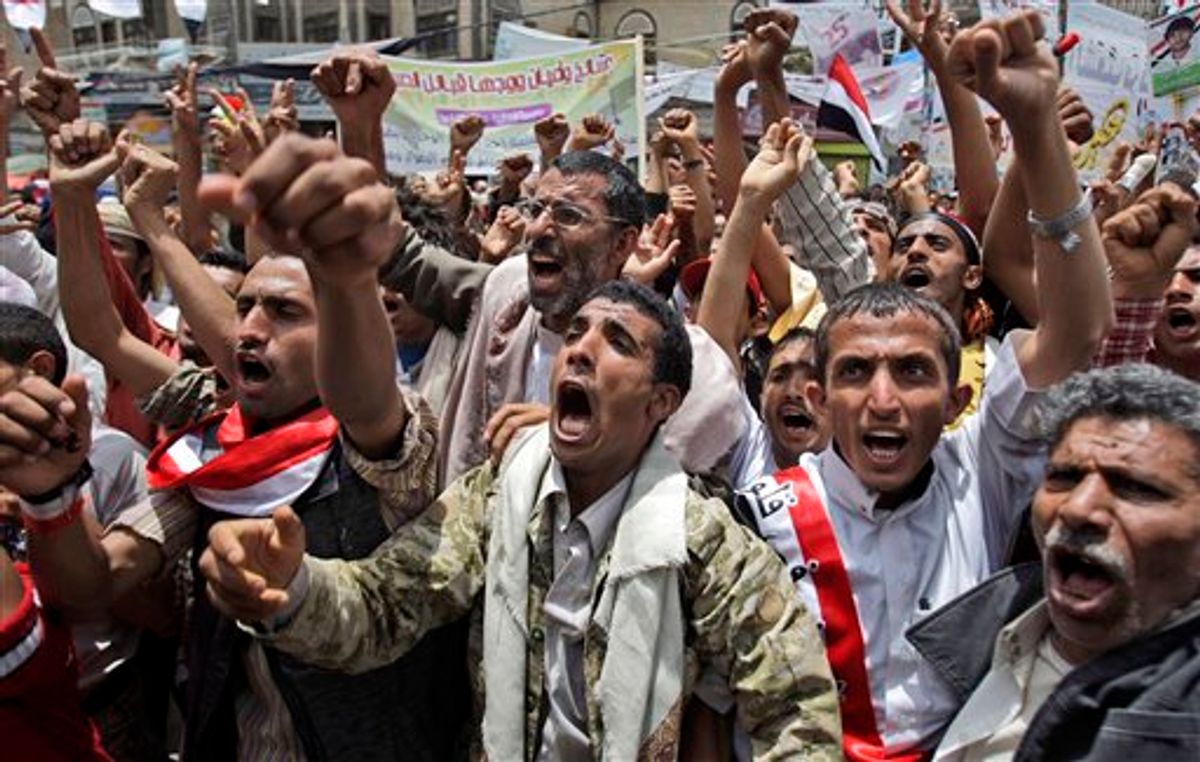Security forces battled in the streets of the Yemeni capital with fighters from the country's most powerful tribe, which has joined the opposition, in an eruption of violence Monday after President Ali Abdullah Saleh refused to sign an agreement calling on him to step down.
The fighting was the fiercest yet between the pro- and anti-Saleh camps, raising fears that the collapse of efforts to negotiate a peaceful resolution to Yemen's 3-month-old crisis could throw the country into a violent confrontation. Hundreds of thousands of Yemenis have been holding protests since February demanding Saleh's removal, and they have been hit by a bloody crackdown -- but before Monday there had been only minor armed clashes between the two sides.
The violence erupted outside the Sanaa home of Sheik Sadeq al-Ahmar, leader of Yemen's largest tribe, the Hashid. Saleh himself belongs the tribe, but al-Ahmar announced in March that the Hashid were joining the popular uprising against the president.
The spark of the fighting was unclear. Some witnesses said security forces had been setting up roadblocks between al-Ahmar's walled residential compound and the nearby Interior Ministry, and that tribesmen saw it as a provocation.
Tribesmen and security forces battled in the streets surrounding the ministry, trading fire with automatic weapons and rocket-propelled grenades. Smoke was seen rising from the ministry building. Tribal fighters took over buildings belonging the nearby Industry Ministry as well, the Interior Ministry said in a statement.
Hundreds of Hashid fighters were moving in from outside Sanaa to al-Ahmar's house to protect it, a tribal offical said, speaking on condition of anonymity because of the sensitivity of the situation.
A Yemeni journalist was injured by flying shrapnel that hit the nearby headquarters of the state news agency Saba, and dozens of other journalists took refuge in the building's basement, according to the head of the Journalists Syndicate, Marawan Damag. He said the crossfire made it impossible to take the wounded man to the hospital.
The Yemeni opposition accused the security forces of trying to "storm" the house of al-Ahmar and it warned of "assaults that aim to drag the country into civil war."
The violence erupted amid heightened tensions following Saleh's refusal to sign a U.S.-backed, Gulf Arab-mediated agreement under which he would step down in 30 days and hand over power to his vice president and a unity government in return for immunity from any future prosecution.
Sunday night, pro-government gunmen and soldiers locked down main streets around the capital with roadblocks, while tens of thousands of anti-Saleh demonstrators were massed at their protest camp in a central Sanaa square, worried that a new crackdown could ensue.
The situation in Yemen is particularly explosive because of the heavy weaponry on both sides. Saleh's regime has been bled dry by a wave of defections by party officials, tribes and -- most importantly -- major units from the national army.
Saleh has been able to cling to power, however, by maintaining the loyalty of Yemen's best trained and equipped military and security units, which are headed by close family members.
Those security forces have occasionally unleashed bloody attacks on the crowds of protesters holding street demonstrations demanding Saleh's removal. The opposition says 150 protesters have been killed during the uprising. But the pro-opposition military units and tribal fighters have avoided fighting with Saleh's security forces, except for scattered minor clashes.



Shares